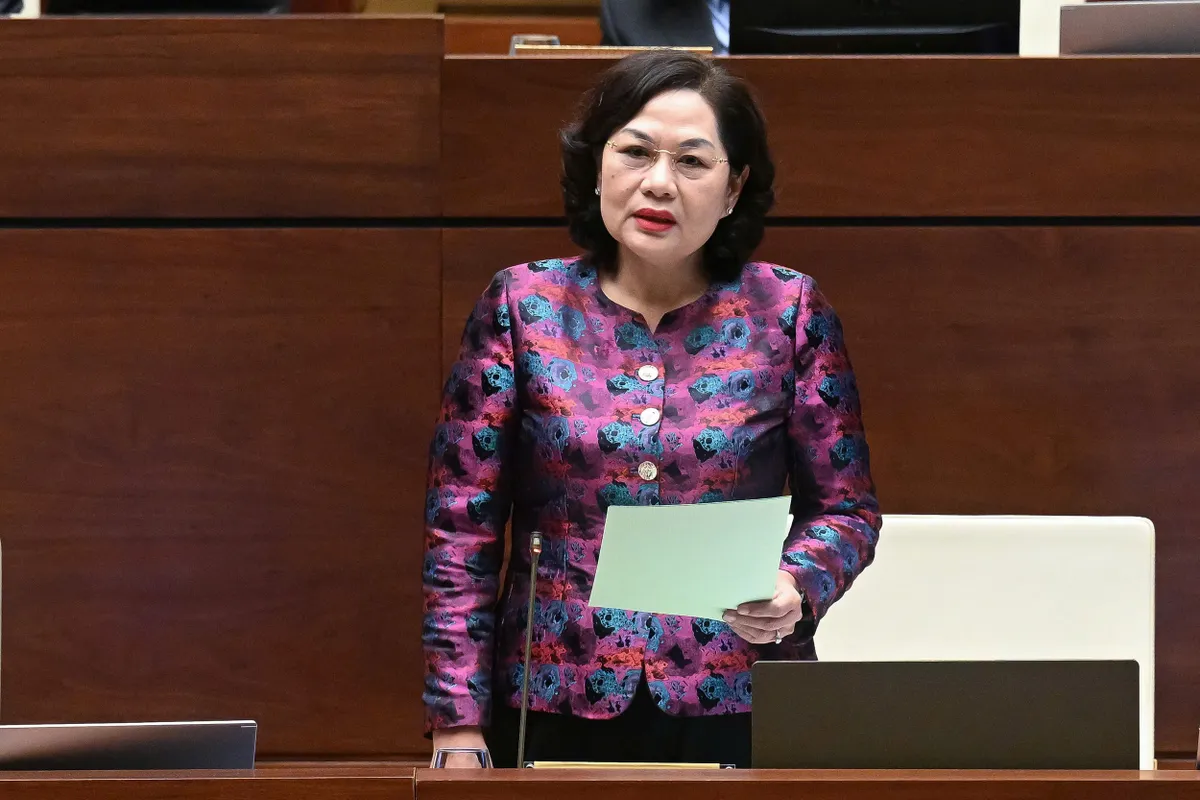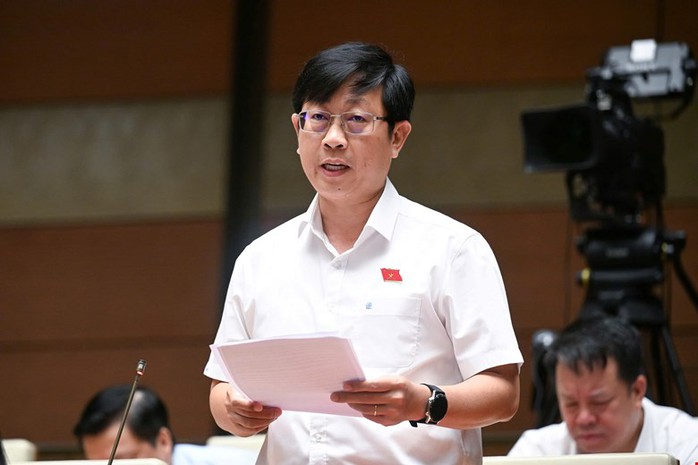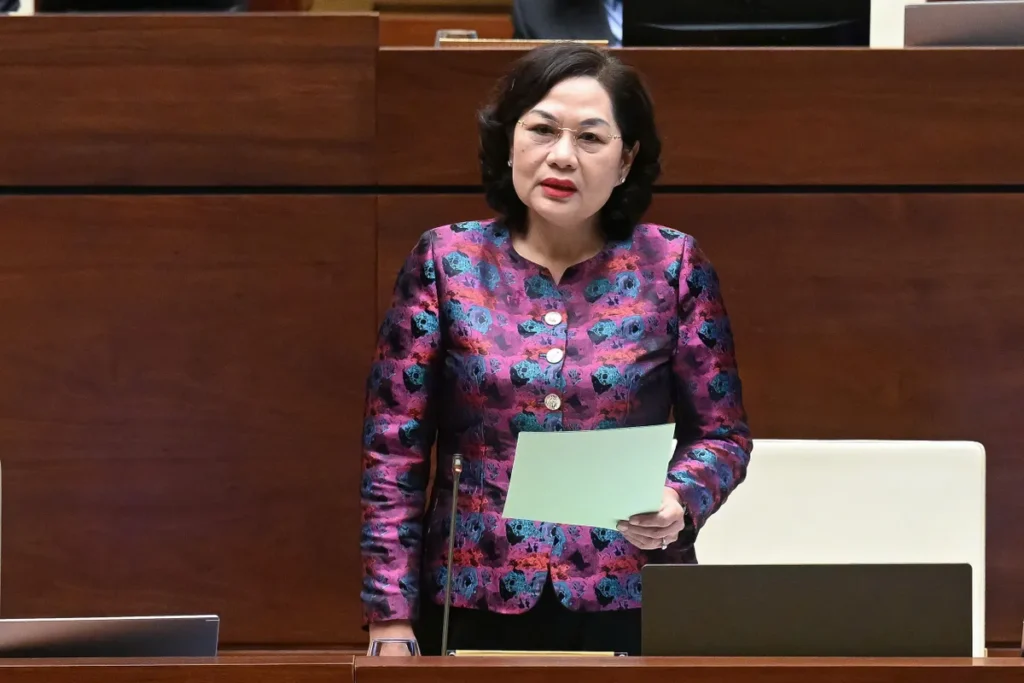Governor Nguyen Thi Hong emphasized that special loans with 0% interest rate and no collateral are not regular and continuous.
There should be a mechanism for quickly handling special issues .
On May 29, the National Assembly discussed in the hall the draft Law amending and supplementing a number of articles of the Law on Credit Institutions. Governor of the State Bank Nguyen Thi Hong explained and clarified the issue of special loans with 0% interest rate and no collateral.
According to current regulations, the authority to grant special loans at 0%/year without collateral belongs to the Prime Minister. In this amendment, the drafting committee proposed to delegate this decision-making authority to the State Bank.
Specifically, the draft law proposes that the State Bank be allowed to decide to grant special loans to credit institutions with or without collateral. The collateral for special loans from the State Bank is as prescribed by the Governor, with an interest rate of 0%/year.

Regarding this issue, the Governor said that according to the old Law on Credit Institutions before the 2024 amendment, special lending was carried out according to the regulations of the State Bank. Here, the State Bank will stipulate whether there is collateral or not, with or without interest. When amending the Law on Credit Institutions 2024, during the process of discussing and completing the draft Law, the authority to grant special loans without collateral and with 0% interest rate was assigned to the Prime Minister.
However, according to the Governor, in the face of the changing reality of the credit institution system in the world as well as in Vietnam, there needs to be a mechanism to quickly handle issues. This is one of the reasons for the proposal to transfer the right to decide on special loans without collateral, with 0% interest rate to the State Bank.
The Governor affirmed that special loans without collateral and 0% interest are not regular and continuous. This is a very special case. The Law on Credit Institutions 2024 has designed a series of regulations to detect early and remotely any credit institutions with problems to put them into a state of early intervention.
During the early intervention process, if a bank has weak liquidity, it will be able to borrow from the State Bank with interest. “It is not like ‘getting a loan with 0% interest rate right away'”, the Governor emphasized.
In addition, special lending is also applied to credit institutions facing mass withdrawals. Because mass withdrawals can spread throughout the system.
javascript:if(typeof(admSspPageRg)!=’undefined’){admSspPageRg.draw(2030173);}else{parent.admSspPageRg.draw(2030173);}
Another case is when a credit institution is under special control, then it is necessary to lend. When considering special loans, banks are always required to have collateral first. Only when there are difficulties and there is no collateral left, then special loans are granted.

Governor Nguyen Thi Hong emphasized that special loans with 0% interest rate and no collateral are not regular and continuous.
Speaking more about the standards and conditions for special loans, 0% interest rate, no collateral, the leader of the State Bank said that it is not necessarily only banks under special control that lend, but also must be based on reality.
“The situation is very different for each bank. The mass withdrawal incident does not only happen to weak banks. Two years ago in the US, First Republic Bank operated profitably for two years but the mass withdrawal incident still occurred, and the risk of collapse was high,” Ms. Hong informed.
The risk of mass withdrawals does not only come from the weaknesses of credit institutions but also from many objective factors. Sometimes, rumors, technological problems, etc. lead to mass withdrawals. When this problem occurs, it needs to be handled very quickly.
Increased authority must go hand in hand with responsibility.
Earlier in the discussion session, regarding the issue of special loans, delegate Nguyen Huu Thong (Binh Thuan delegation) assessed that this is a strong support policy, clearly demonstrating the role of the State Bank in supporting credit institutions in particularly difficult situations, in order to maintain the safety of the financial and banking system.
However, delegate Thong is concerned that the regulation of a 0% interest rate per year without specific application conditions could lead to policy abuse, create risks, distort the competitive environment between credit institutions and increase pressure on the national budget.
Besides, this regulation is likely to contradict market principles, affecting the efficiency of using state resources if there is no control mechanism.

Delegate Nguyen Huu Thong (Binh Thuan delegation)
Therefore, Mr. Thong suggested that it is necessary to specify: “The 0% interest rate only applies to credit institutions under special control, mandatory restructuring or having a systemic impact on national financial stability”. At the same time, it is necessary to add a mechanism to monitor, publicize and evaluate the effectiveness of the use of this special loan source.
Sharing the same view, Mr. Nguyen Hai Nam, a full-time National Assembly delegate at the National Assembly’s Economic and Financial Committee, suggested that the drafting committee should clearly define the criteria, regulations, and limits for special loans with 0% interest rate. According to Mr. Nam, the regulations need to be considered and balanced with the financial resources of the State Bank. Mr. Nam said that special loans also narrow the space for monetary policy, so it is necessary to have regulations on loan limits.
In addition to decentralization and delegation of authority to the Governor of the State Bank to decide on special loans, delegate Nguyen Hai Nam said the draft law has not mentioned the issue of responsibility. According to Mr. Nam, strengthening authority must go hand in hand with responsibility, as lending activities are always associated with risks.
“I have not seen the draft mention responsibility. In case of risk, the responsibility lies with the individual or the collective” – delegate Nam wondered and asked the drafting committee to clarify further.
















